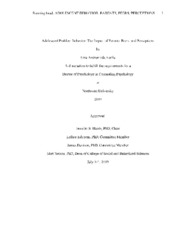| dc.contributor.author | Kurlis, Lina Andromeda | en |
| dc.date.accessioned | 2019-12-19T19:23:33Z | |
| dc.date.available | 2019-12-19T19:23:33Z | |
| dc.date.issued | 2019-07-31 | en |
| dc.identifier.uri | archives.northwestu.edu/handle/nu/46587 | en |
| dc.description.abstract | The relationship between negative parent-adolescent relationships and problem behavior, such as substance use and delinquency, has been validated through research in several ways, often citing increased peer influence and perceptions about peers' involvement in problem behavior as potential contributing factors. The current study examined perceived peer conduct and resistance to peer influence as moderators in the relationship between parent-adolescent relationship quality and delinquency. Twenty-nine participants were referred by school administrators as part of a substance use intervention program. Participants were given questionnaires to measure parent-adolescent relationship quality, delinquency, perceived peer conduct, and resistance to peer influence. Conditional process analysis was used to test the hypothesis that the relationship between parent-adolescent relationship quality and adolescent problem behavior would be moderated by susceptibility to peer influence and perceptions of peer conduct. The overall model was significant; however, there were no significant direct effects of parent-adolescent relationship quality on problem behavior, perceived peer behavior on problem behavior, or susceptibility to peer influence on problem behavior. Correlational analyses revealed a significant correlation between problem behavior and perceived peer behavior. Therefore, the lack of significant direct effects may be explained by the study being under powered. The model proposed in this study should be further researched with a larger number of participants. An implication of this research is that delinquency is associated with perceptions of peer delinquency, which is consistent with past research. This information should be considered in the development of treatment interventions in order to prevent or decrease negative outcomes for adolescents involved with delinquent peers. | en |
| dc.format.extent | 121 pages | en |
| dc.format.medium | PDF | en |
| dc.language.iso | en | en |
| dc.publisher | Northwest University | en |
| dc.rights | This original work is protected by copyright. Copyright is retained by the author(s). Works may be viewed, downloaded, or printed, but not reproduced or distributed without author(s) permission. | en |
| dc.rights.uri | http://archives.northwestu.edu/page/copyright | en |
| dc.subject | Adolescence | en |
| dc.title | Adolescent Problem Behavior: The Impact of Parents, Peers, and Perceptions | en |
| thesis.degree.name | Doctor of Psychology in Counseling Psychology | en |
| thesis.degree.level | Doctoral | en |
| thesis.degree.grantor | Northwest University | en |
| thesis.degree.discipline | College of Social and Behavioral Sciences | en |


 Maintained by the Northwest University Library
Maintained by the Northwest University Library